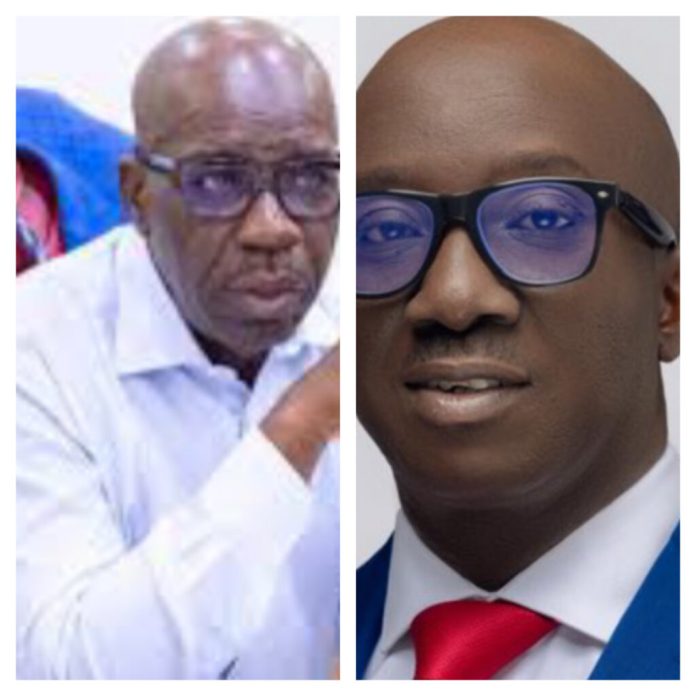Edo State Governor-elect, Senator Monday Okpebholo, has taken a bold step towards ensuring transparency and accountability in governance. On Sunday, the Governor announced the formation of a 14-member State Assets Verification Committee to scrutinize the previous administration led by Godwin Obaseki. This development aims to shed light on the state’s assets and liabilities, which many believe were not adequately disclosed by the past administration.
The announcement was made in a statement released by Fred Itua, the Chief Press Secretary to the Governor. According to the statement, the committee will officially begin its work on Tuesday, November 26, 2024, with an inauguration ceremony at the Government House in Benin City.
Who Are the Members of the Committee?
The committee is a mix of seasoned professionals, political figures, and respected individuals from Edo State. Here’s a rundown of the team:
- Dr. Ernest Afolabi Umakhihe – Chairman
- Anslem Ojezua – Deputy Chairman
- Prince Kassim Afegbua – Member
- Hon. Patrick Ikhariale – Member
- Mr. Taiwo Akerele – Member
- Hon. Patrick Idiake – Member
- Hon. Rasaq Bello-Osagie – Member
- Mr. Fredrick Unopah – Member
- Frank Osumuede Edebor Esq. – Secretary
- Mrs. Abdallah Eugenia – Member
- Hon. Patrick Obahiagbon – Member
- Pharm. Kenny Okojie – Member
- Mrs. Lyndsey Tes-Sorae – Member
- Hon. Abass Braimoh – Member
These individuals bring diverse expertise and perspectives to the table, ensuring a thorough review of the state’s assets and liabilities.
The Governor emphasized the importance of this committee in fulfilling his promise to bring Edo State onto a path of development driven by transparency and accountability. According to the statement, there have been persistent concerns about the limited and vague disclosure of assets and liabilities by the previous administration. Governor Okpebholo believes that a more comprehensive database of the state’s financial standing is essential for proper planning and governance.
The Governor’s office stated:
“Despite repeated calls for a more holistic database of the assets and liabilities of the previous administration, the Godwin Obaseki-led government provided scanty and incomplete information.”
By constituting this committee, Governor Okpebholo seeks to ensure a clear understanding of what was left behind by his predecessor. This step aligns with his campaign promises to promote transparency, probity, and a governance process that involves all stakeholders.
The committee’s primary responsibility is to verify the state’s assets and liabilities, ensuring that no stone is left unturned. This includes reviewing financial records, evaluating the condition of public properties, and identifying any discrepancies in the previous administration’s reporting. The findings of this committee are expected to provide a solid foundation for the current administration to plan its development strategies effectively.
Governor Okpebholo is committed to making Edo State a model for good governance, and this initiative is one of the key ways he intends to achieve that goal. The Governor’s statement reiterated:
“In line with the Governor’s campaign promise to ensure probity, accountability, and transparency in government, and to deepen the governance process, this committee has been constituted.”
The committee’s inauguration is scheduled for Tuesday, November 26, 2024, at 1 PM. The event will take place at the Festival Hall in the Government House, Benin City. This ceremony will officially mark the beginning of the committee’s work, and it is expected to draw significant attention from the public and political observers alike.
This move by Governor Okpebholo sends a strong message about his administration’s commitment to accountability. By examining the previous government’s handling of state resources, the Governor aims to ensure that any irregularities are addressed, and that future administrations are held to higher standards of transparency.
The committee’s work could have far-reaching implications. If it uncovers any misconduct or mismanagement, there may be calls for further investigations or legal actions. On the other hand, if the review reveals that the previous administration acted in good faith, it could help bridge the political divide and foster a spirit of collaboration for the state’s progress.
As news of the committee’s formation spreads, reactions from citizens and political commentators have been mixed. Supporters of Governor Okpebholo see this as a necessary step to bring accountability to governance, while critics argue that it could be a political move aimed at discrediting the Obaseki administration.
For many residents of Edo State, however, the focus is less on politics and more on results. People want to see improvements in infrastructure, education, healthcare, and other critical sectors. The hope is that the findings of this committee will pave the way for better resource management and a brighter future for the state.
The next few weeks will be crucial as the committee begins its work. Governor Okpebholo has urged the members to carry out their duties diligently and without bias. The public will be watching closely, not only to see what the committee uncovers but also to assess the Governor’s sincerity in driving change.
As Edo State embarks on this path of accountability and reform, it sets an example for other states in Nigeria. By prioritizing transparency and responsible governance, Governor Okpebholo hopes to build a legacy of trust and progress.
In the words of the Governor’s Chief Press Secretary, Fred Itua:
“This is not just about looking into the past; it’s about laying a strong foundation for the future.”

